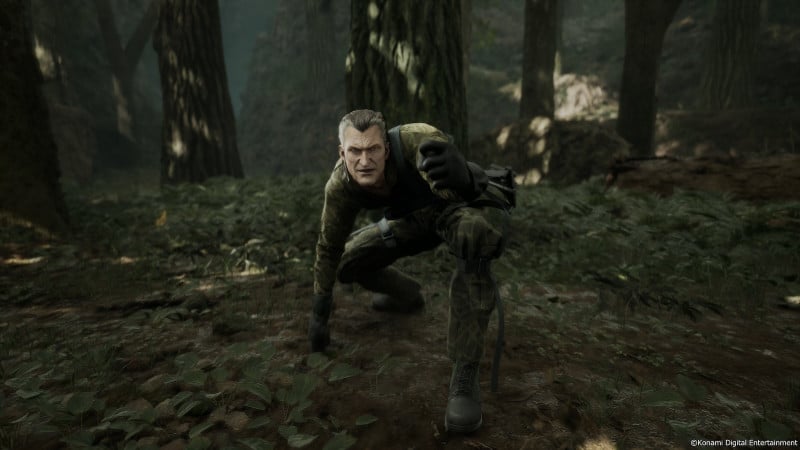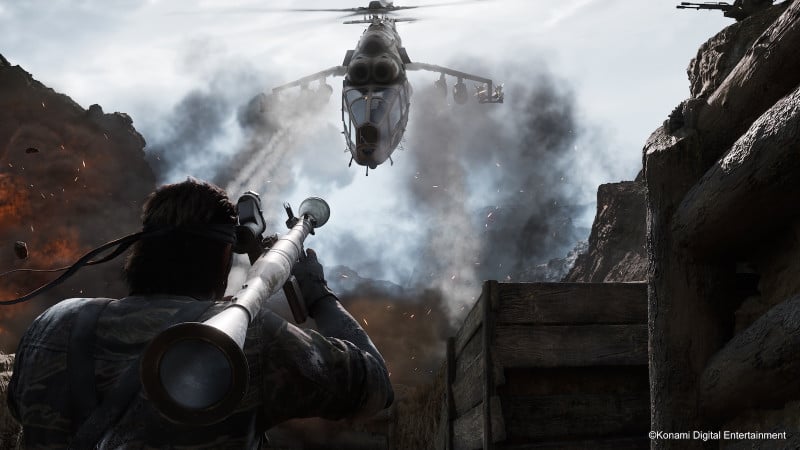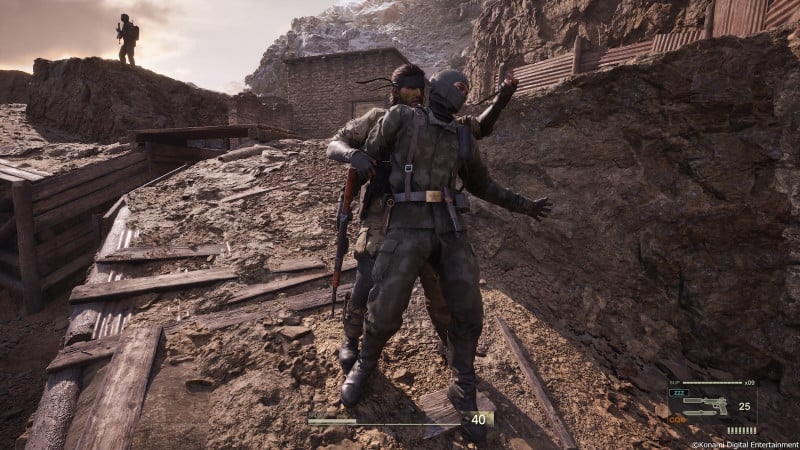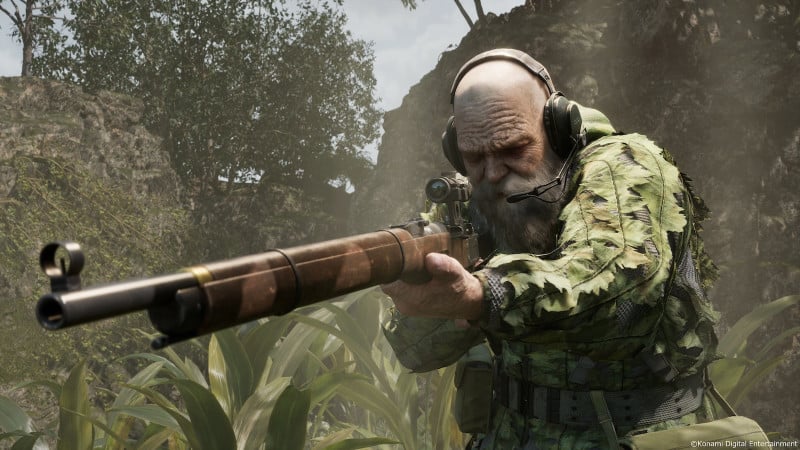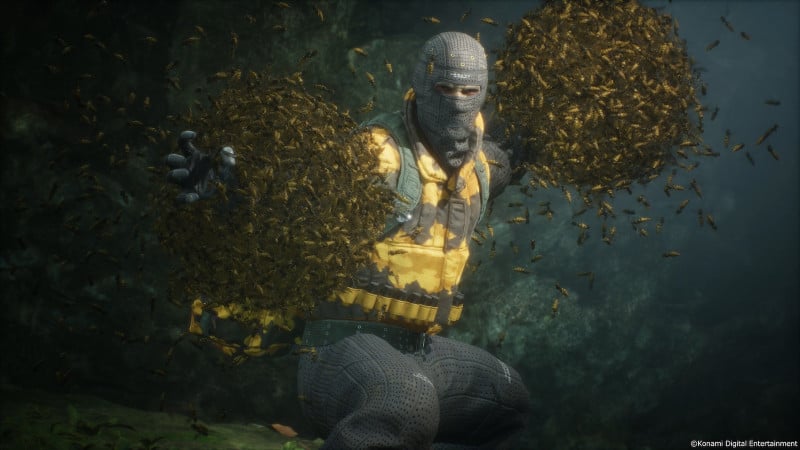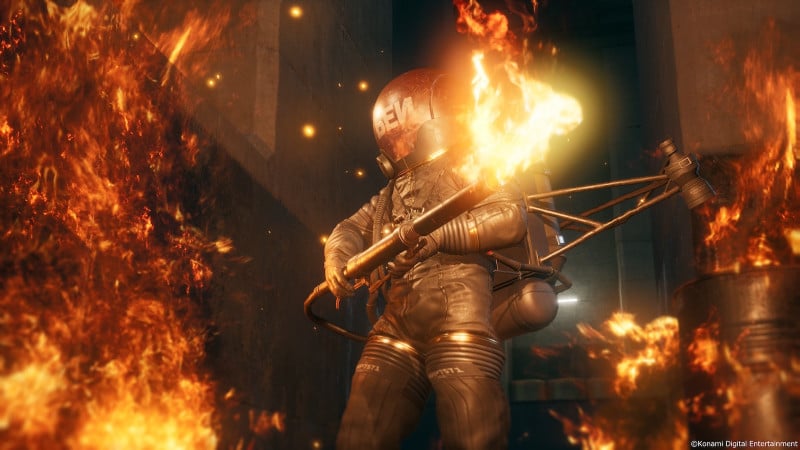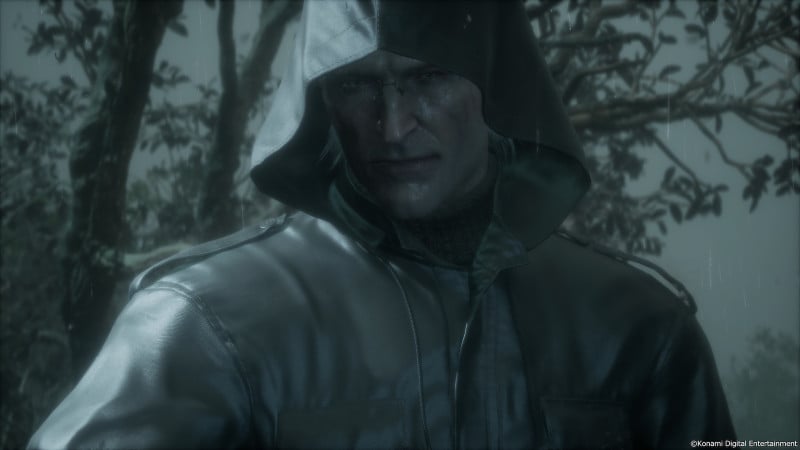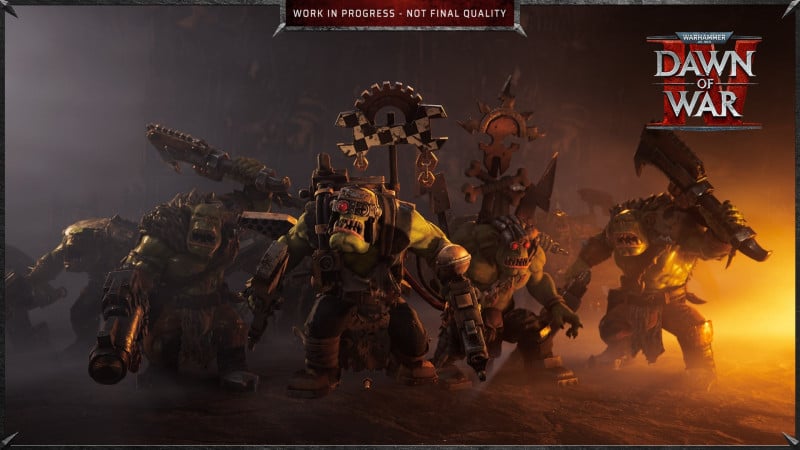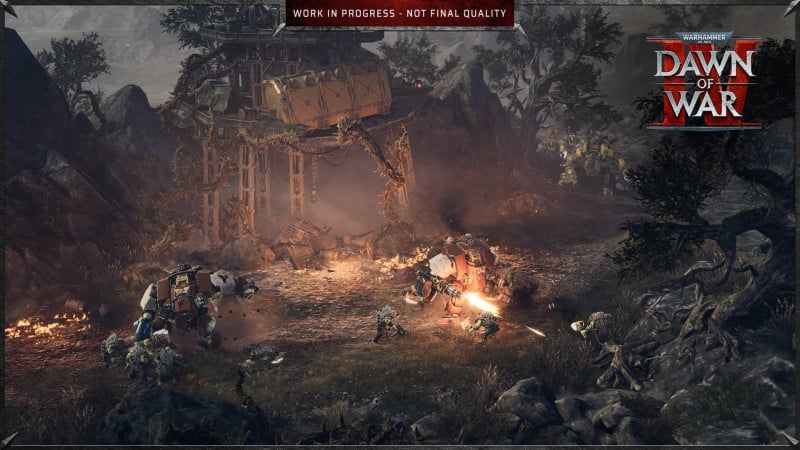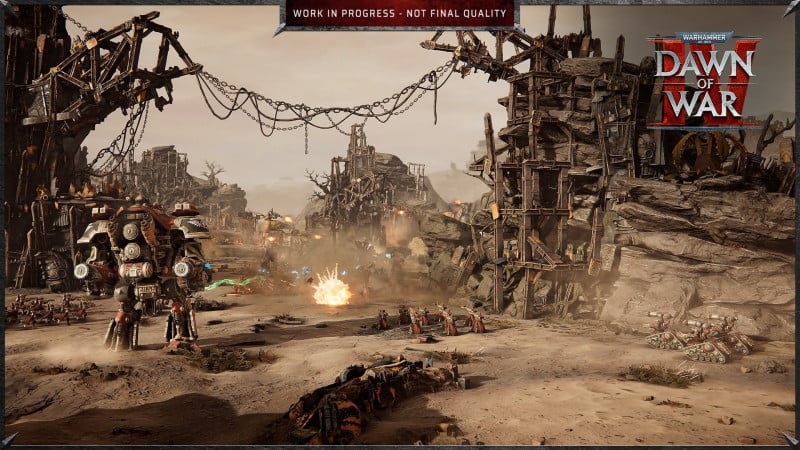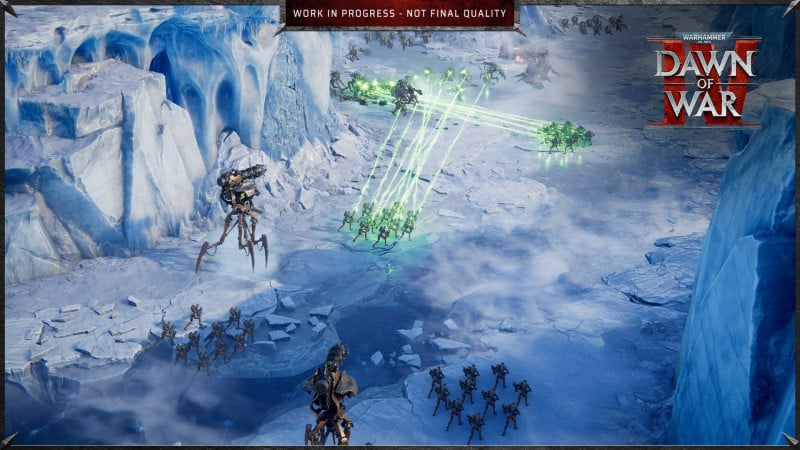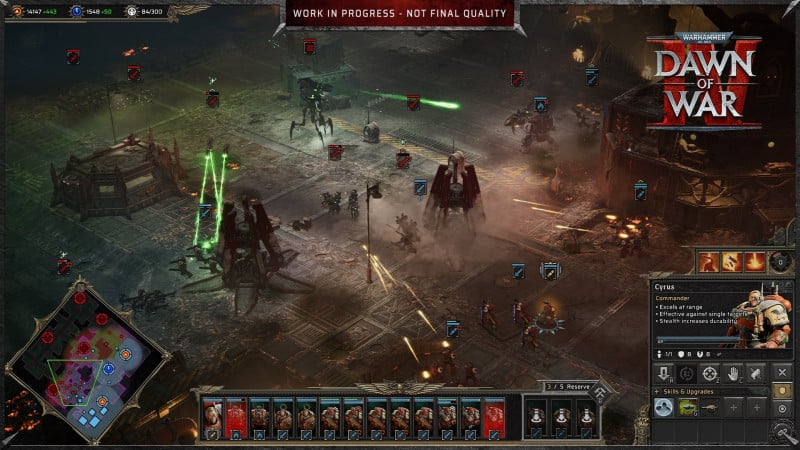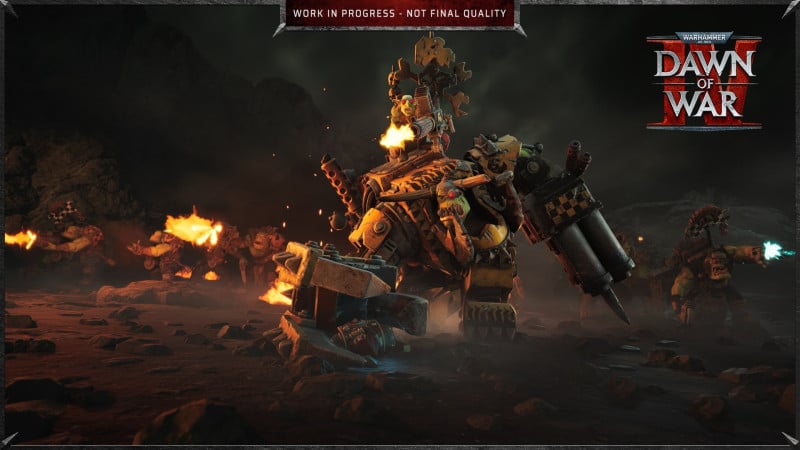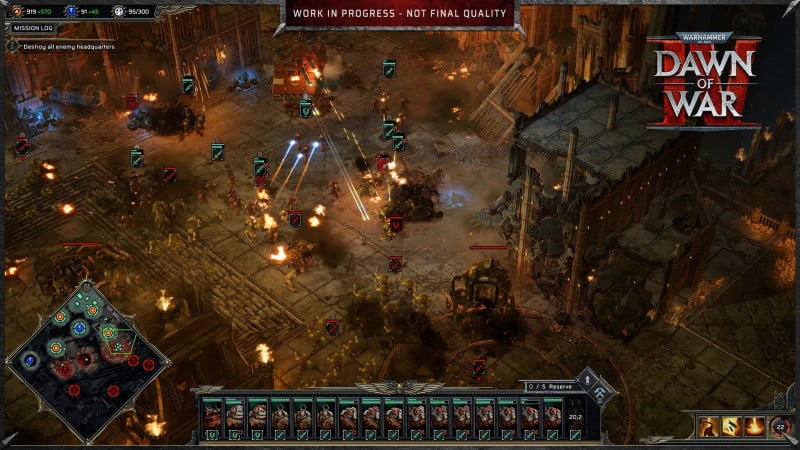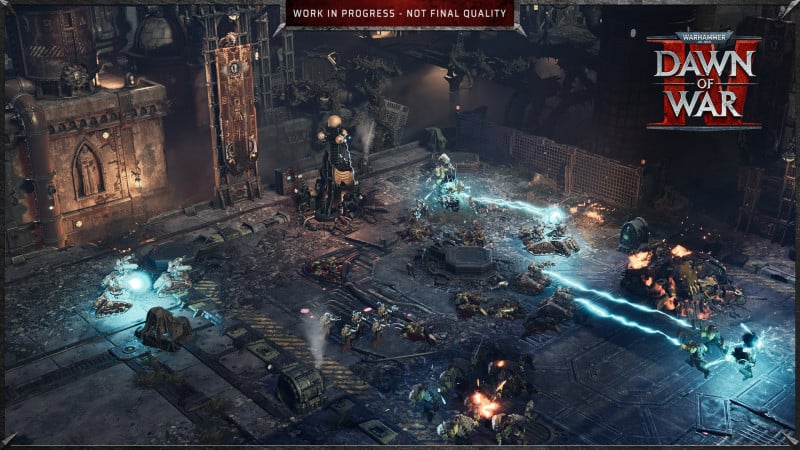Reading List
The most recent articles from a list of feeds I subscribe to.
If Metal Gear Solid Delta: Snake Eater Is Successful Its Producers ‘Would Like To Consider Lots Of Other Games In The Future’
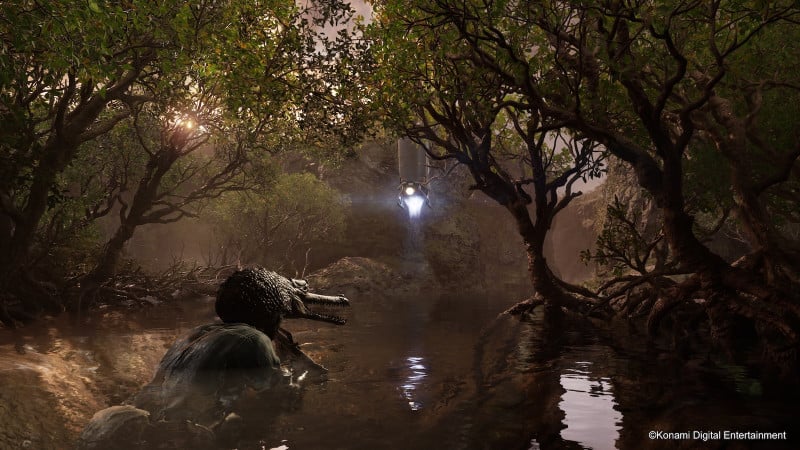
Earlier this month, we visited New York for a Metal Gear Solid Delta: Snake Eater event, where we got to play the game for review and meet some of the people involved with the original game and remake, including Delta producers Noriaki Okamura and Yuji Korekado. Okamura has served various roles from writing support to producer on the Metal Gear franchise, starting with Metal Gear Acid 2 in 2005. Korekado served roles on nearly every Metal Gear Solid game, as well as other Hideo Kojima projects like Policenauts. They have been working on the franchise for a long time, and both worked on Metal Gear Solid 3: Snake Eater or its subsequent re-releases.
We spoke to both Okamura and Korekado through a single translator (making it difficult to attribute exactly who said what), and they were understandably excited about the release of Delta, and though willing to talk about Hideo Kojima, they didn’t have much to say. They reiterated that they wanted to stay as true to the vision of the original game as possible and said they hope he checks out the game someday, but otherwise mainly offered polite platitudes about their time working with him and on the original game, of which they have fond memories.
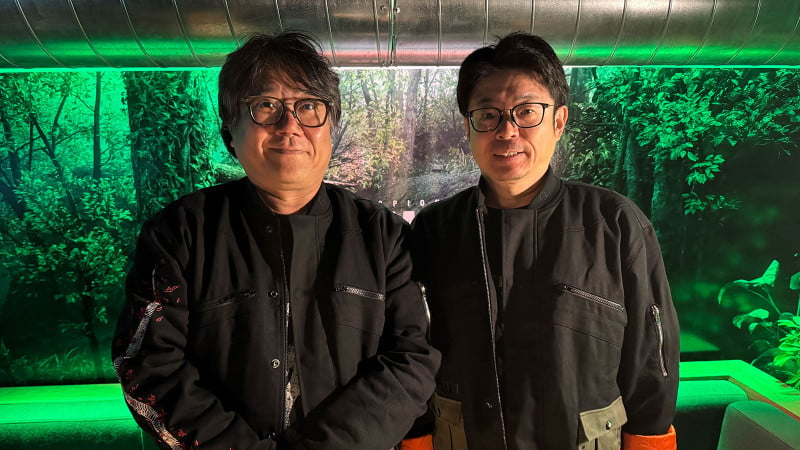 Metal Gear Solid Delta: Snake Eater producers Noriaki Okamura (left) and Yuji Korekado
Metal Gear Solid Delta: Snake Eater producers Noriaki Okamura (left) and Yuji Korekado
“When we revisited Metal Gear Solid 3 for Delta, we were quite surprised, even just from the development side, when we went back and modernized this game for current-day audience,” Okamura and Korekado said. “Even just taking that original concept without even changing it? The game still had so many good points and a lot more charm and a lot more emotion and everything, even though we hadn’t really changed anything or added new features at that point. The game still had a lot to offer even though it’s now 20 years old.”
As you can read in our review, it is impressive how one-to-one Delta is to the original. It looks drastically better, some controls have been modernized, and the camo system is improved, but otherwise, Delta is the Metal Gear Solid 3 you remember. It even has secrets that we didn’t think would have made it into a remake.
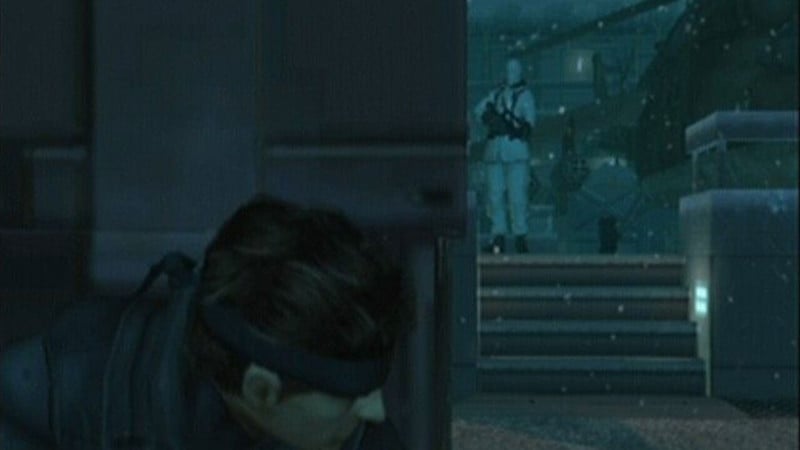 Metal Gear Solid: The Twin Snakes (2004)
Metal Gear Solid: The Twin Snakes (2004)
This isn’t the first time a Metal Gear Solid game has been remade, however. The 2004 GameCube game, Metal Gear Solid: The Twin Snakes, took a different approach. It re-recorded all the dialogue with the same actors, changed how the primary shooting worked, and all the game’s cutscenes were rewritten and directed by filmmaker Ryuhei Kitamura, per Hideo Kojima’s request. Though generally well-received, it is not considered the definitive version of the original Metal Gear Solid, with fans complaining about the changes made to various characters’ accents and the game feeling more like a bombastic action film than a stealthy espionage tale.
I asked Okamura and Korekado if the team looked at Twin Snakes and if it influenced the development of Delta. “Not in particular,” they said. “In regards to any game, when we make a game, there are loads of things we learn each and every time we develop a game. There’s nothing in particular that connects to Twin Snakes that we would say has had any impact this time around. And the way we’ve remade the game is completely different. This is a full-on remake without really changing very much from the original game.”
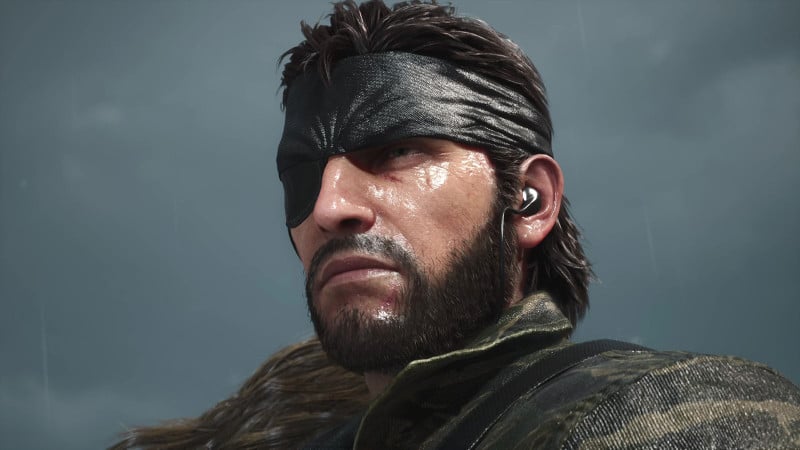 Metal Gear Solid Delta: Snake Eater (2025)
Metal Gear Solid Delta: Snake Eater (2025)
With the release of Delta on August 28, the future of Metal Gear Solid is uncertain. Its creator, Hideo Kojima, is completely separated from Konami and the franchise, and is even working on an original “action espionage” game with Sony called Physint. I told Okamura and Korekado that if they plan to continue pursuing remakes, I would like Metal Gear Solid 2 next, and they laughed and simply said, “Thanks,” but they did offer a little bit about what the future of Metal Gear may be.
“We are always thinking about what we could do for the Metal Gear series, but in regards to remaking future titles, currently we’re just focusing on the now, and we thought what would be the best way to reach both the old fans and potential new fans, as well,” Okamura and Korekado said. “At the moment, we are focused on delivering Delta in the best possible way to the current generation, and once this game is released, if the fans feel they would like to see more from playing the game, then we would like to consider lots of other games in the future. For now, this is it.”
For more on Metal Gear Solid Delta: Snake Eater, you can read our interview with some of the members of the original voice cast, and find our 9 out of 10 review for the game here.
'It’s The Definitive Role Of My Life' Metal Gear Solid: Snake Eater's Voice Cast Reflects On Its Legacy Ahead Of Delta
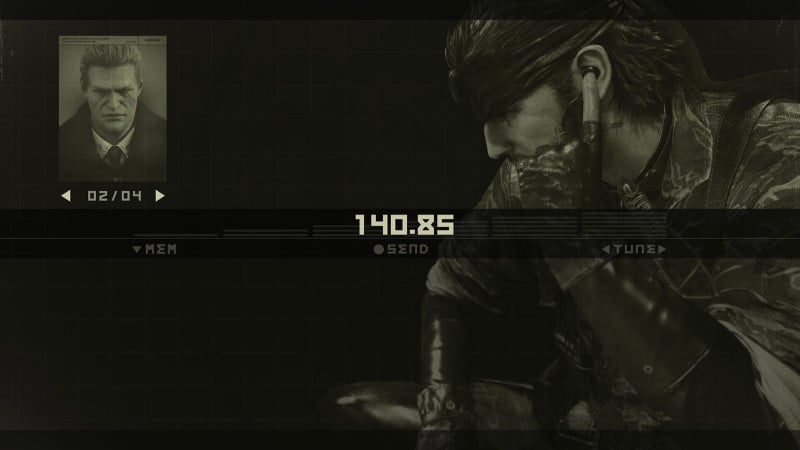
Earlier this month we visited New York for a Metal Gear Solid Delta: Snake Eater event where we got to play the game for review and meet some of the people involved with the original game and the remake, including some of the voice cast. We spoke with David Hayter, who voiced Snake in every interation of Metal Gear Solid, except for Ground Zeroes and Phantom Pain, and Lori Alan, who voices The Boss. Hayter and Alan did not re-record dialogue for Delta, save for a few added tutorial lines, but they were on hand to reflect on the experience of recording Metal Gear Solid 3: Snake Eater and share their excitement for the remake.
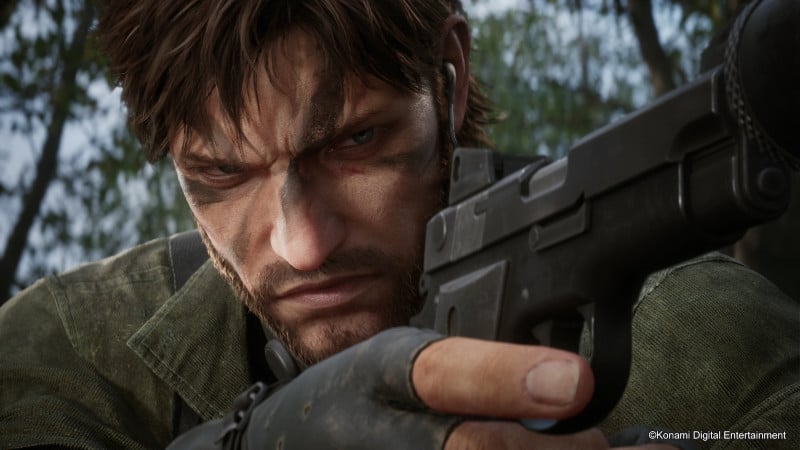
What were the lines that needed to be re-recorded?
Hayter: It’s primarily the original recordings. For the voices, they really wanted it to feel like the original. The lines we did were mostly new controller instructions. And I think I had to clean up one time saying “bastard” or something and saying it a little softer. I don’t know why.
Alan: I didn’t have to say anything over.
Hayter: Oh, because yours was perfect?
Alan: Yes, mine was perfect [laughs].
Hayter: I am not surprised.
Alan: Well of course! The instructional. That was it. It was really fascinating. I’ve had a low voice for a long time. I’ve been sounding like this since seventh grade. But I remember thinking I had to sort of to drop my voice [for The Boss], but now I am thinking, “Oh, I’m already there now.”
Hayter: Yeah, I have become a lot Snakier over the years.
Alan: And I’ve become a lot Bossier. I just wanted everyone to feel the same feelings they felt when they played it the first time.
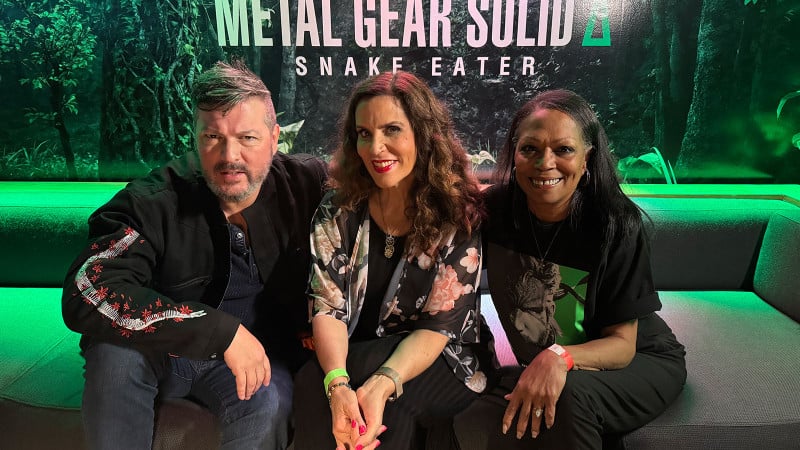 From left to right, David Hayter (Snake), Lori Alan (The Boss), and Cynthia Harrell who sings the Snake Eater theme song
From left to right, David Hayter (Snake), Lori Alan (The Boss), and Cynthia Harrell who sings the Snake Eater theme song
How much is The Boss the character that fans associate you with? I would assume it’s not the first, but how often is it The Boss?
Alan: I think it’s more now with the anticipation of Delta coming out, I get it a lot. In fact where we’re staying here in New York I called to talk to them about the rooms and they go, “Your voice sounds so familiar,” and then when I had gotten in my room they did a nice drawing of The Boss. It was very, very cool.
But of course I am on another show that’s absolutely crazy called SpongeBob SquarePants.
I assume that is number one.
[Spoken in Pearl Krabs’ voice] The character is quite different.
It’s usually one or the other.
Hayter: Do you ever mix the two up in the booth?
Alan: Yes, yes. It’s very confusing.
Hayter: “SpongeBob – loyalty to me? Or to the mission?”
Alan: Loyalty to me or to the sponginess?
[Spoken in Pearl Krabs’ voice] CQC?
This is very left field. I am not sure if anyone has ever asked you this, but did you watch the HBO Watchmen show?
Hayter: I did, yeah.
Did you enjoy it? I associate you with the film version of Watchmen.
Hayter: I was on it for eight years trying to get it made, so yeah. I did watch it. I loved it. I thought it was super creative. I thought it really felt like Alan Moore and Dave Gibbons’ world. I was very impressed. I dug it.
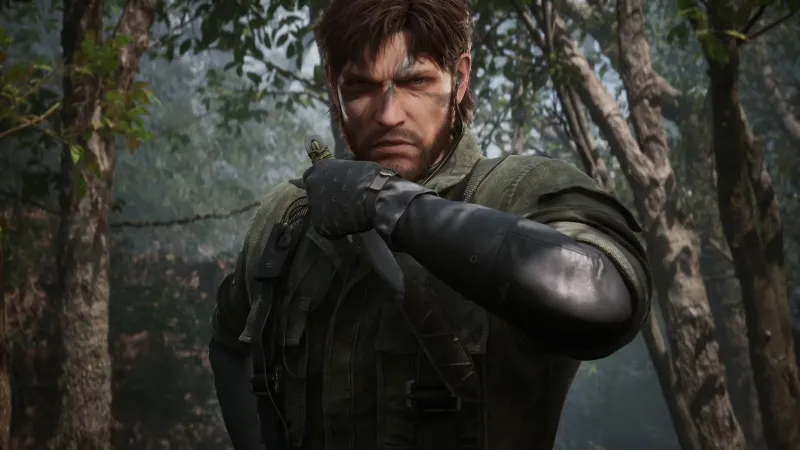
Who knows what the future holds for Metal Gear at this point, but are you open to revisiting the characters if there is a future entry?
Alan: Yeaaah.
Hayter: Yeah. Anytime they ask me to be Snake, I’m in. It’s the definitive role of my life. It’s so complex and so profound and there are so many different aspects to both him and Big Boss – any time it comes up, I am down.
Alan: Me, too. I just hope it lives on forever and ever and ever. Obviously, we’re so thrilled that there is a different generation that gets to play it. It’s so epic and such a beautiful game and it’s so complex. We also have the best fans in the world. I learn so much about the game continuously from them because it’s dense and epic and all that. So of course, the more the merrier. I think we’d all be beside ourselves for it to keep going.
Hayter: Yeah, and to Lori’s point, I get so many people coming up to me now saying, “I just got into Metal Gear last year,” because of the Master Collection. It’s so cool. 18-year old fans and kids discovering it for the first time. It’s very, very cool. A great game should be like a great movie or a great album. It lives on. And a lot of times because consoles change and technology changes, a lot of times games disappear. I’m just grateful Konami is behind this they way they are.
For a whole lot more on the voice acting in Metal Gear Solid, check out Game Informer's deep dive podcast special featuring extensive interviews with the cast of the original game.
Metal Gear Solid Delta: Snake Eater Review - No Going Back
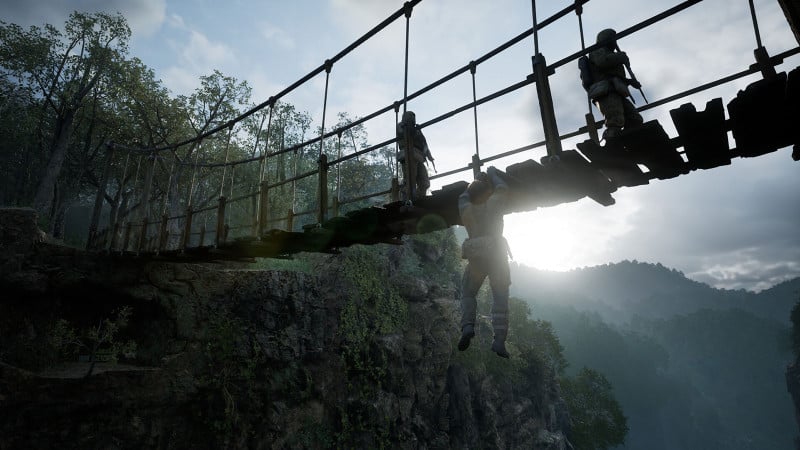
Reviewed on:
PlayStation 5
Platform:
PlayStation 5, Xbox Series X/S, PC
Publisher:
Konami
Developer:
Konami
Release:
Rating:
Mature
Metal Gear Solid 3: Snake Eater is a PlayStation 2 classic in a way not many games from that era are. Few games from that generation continue to hold up graphically, narratively, and remain fun to play. Metal Gear Solid 3 is still impressive to look at and play, even in 2025, which is a testament to Hideo Kojima and the team that created and released it in 2004. I never thought it needed a remake, but now that it’s here, I’m not sure I will ever be able to go back to the original versions.
Watch Our Metal Gear Solid Delta Review:
As Konami grapples with what to do with Metal Gear without its creator, the decision to specifically revisit Snake Eater makes sense. Along with ranking as a favorite among series fans (myself among them), it is also the first in the broader storyline. It has always been my recommendation for anyone looking to dive into the dense but engaging story, and this version will now be my recommendation moving forward.
My biggest fear with the remake was that without Kojima’s involvement, the game would lack a soul, an admittedly impossible-to-define element. However, because the game is such a direct adaptation of the original with only a handful of understandable changes, that element of the game came over just fine in the copy/paste/improve process. Even without the original creator’s involvement, the fact that it came from a team with such a specific and expertly executed idea and point of view remains intact. Decisions like not re-recording the dialogue (as they did for the GameCube remake of Metal Gear Solid, Twin Snakes) and keeping all of its strange bonuses and secrets (Snake can still have a nightmare), all add up to Delta feeling as compelling as it did in 2004, which is a feat. The few changes that were made, however, are smart.
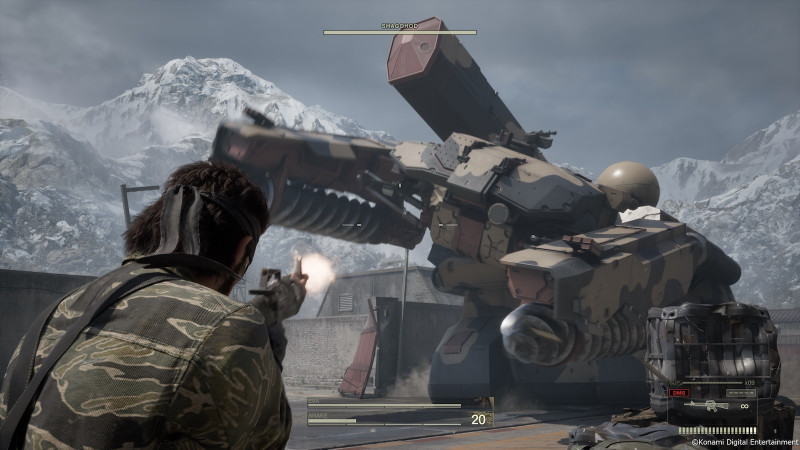
Visually, the team at Konami has fully brought the game up to contemporary standards. Snake looks amazing, and you can see every scar from every battle on his exhausted face. The jungle, in particular, with its dense foliage and various animals, looks terrific. And though no element of the cinematography or cutscene choreography has been changed, it is filled with renewed life thanks to all the heightened detail and new lighting. Later sections of the game, when you are spending more time in plain military buildings than outdoors, lack the impressive pop of those early moments, but they still look fantastic.
You can use the original controls if you desire, but the new standard controls make Snake move and shoot more like a modern third-person shooter. It took some getting used to, and early in my playthrough, I would panic when I got caught, and muscle memory would make me press the wrong buttons, but I can’t imagine ever going back to the way things were. I was popping off tranquilizer headshots quickly and efficiently and having a good time doing it. Quick-changing camo with shortcut keys is also a godsend and finally fixes an element of the game that has always annoyed me.
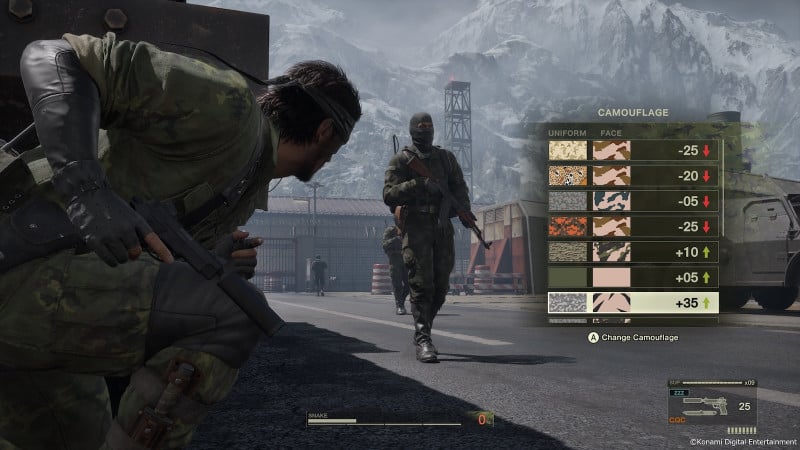
One place where Delta’s age does show is in its writing. Don’t get me wrong – it has been years since I played without skipping most cutscenes. For this playthrough I remained fully and consistently engaged with the characters and the story's direction. The Boss’ journey has always been the highlight of Snake Eater, and I appreciated it all the more playing the remake.
But there are moments where you just have to suspend disbelief. Why wouldn’t they take Snake’s radio when they put him in jail? Why do they let Tatyana, their prisoner, more or less come and go as she pleases? In one moment, antagonist Volgin literally says, “Very well. I'll explain it before I kill you,” before settling into an extended and frankly absurd monologue doing precisely what he promised. It also takes entirely too long for the game to start. As a longtime fan of Snake Eater, I find these elements charming and even comedic, but I completely understand if a newcomer gets frustrated by the excessive and frequently self-indulgent character lectures.
Metal Gear Solid Delta makes the case for its existence quickly. It smartly adheres to what made the original game great with evident reverence and makes updates only to the most crucial elements. For fans like me, it colors Snake Eater in a new light and elevates it to something better than I remembered. It’s impossible for me to objectively imagine this being my first experience with Snake Eater, but I am extra excited for those players who have always been curious about Metal Gear for this to be their starting line.
Score: 9
Warhammer 40,000: Dawn Of War IV Makes Me Want To Become An RTS Sicko
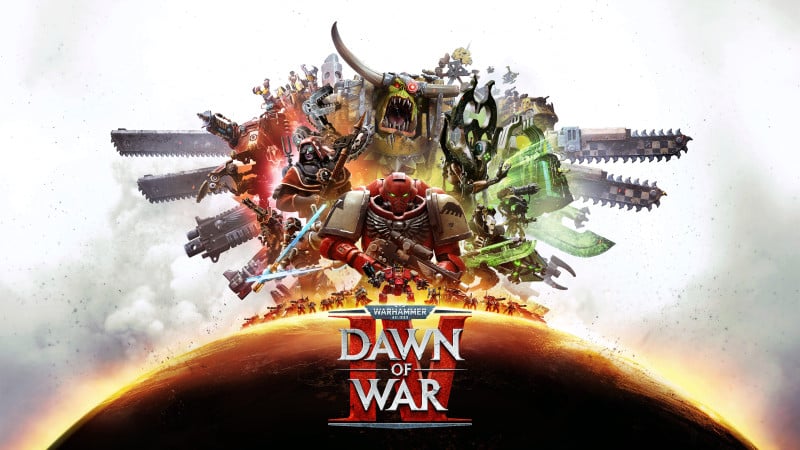
Warhammer 40,000: Dawn of War IV was originally on my Gamescom schedule as "Unannounced RTS game," and I took the appointment out of pure curiosity. I haven't played an RTS game in ages, save for the excellent Pikmin games, and I wanted to know what "unannounced" was – when I saw Dawn of War IV announced during Opening Night Live earlier this week, I immediately knew it was the game I had an appointment booked for.
I'll be honest: my excitement for this appointment was quickly dampened when I saw the reveal trailer for Dawn of War IV. I'm not super familiar with the Warhammer 40,000 franchise, save for last year's great Warhammer 40,000: Space Marine 2, and, as I already mentioned, RTS games aren't really for me. Fast forward two days later and I'm sitting on a bench in Cologne, Germany, an hour separated from my hour-long Dawn of War IV hands-on preview, eating those words (or thoughts, rather – I promise I didn't talk out loud while sitting surrounded by strangers during Opening Night Live).
Now, let me preface this: I didn't do well during my hands-on preview of the game. In fact, I struggled to make any forward progress as the Blood Ravens (Space Marine) faction against the Orks. Sitting in a room surrounded by other members of the press who clearly live and breathe RTS games, I knew I was doing terribly. However, it's how poorly I was doing that has me wanting to play this game more; I'm even considering giving the older Dawn of War games a try, though it's clear based on the in-room sentiment that I should avoid Dawn of War III.
Not only did I have a good time tinkering with Dawn of War IV's many, many, many systems, units, buildings, and more, but I feel compelled to learn how this RTS series works, if only, at least, to go back and defeat the Orks in that single mission. It wasn't like playing a Soulslike or another challenging type of game where I just need to keep practicing; I need to learn Dawn of War IV's systems, understand how different combos work best together, and learn the strategy behind gaining ground, winning and holding control points, and ultimately, defeating the enemy.
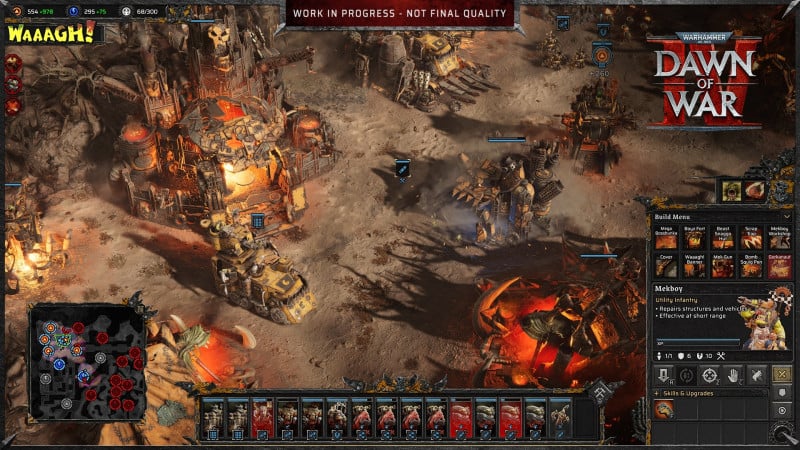
The single pre-alpha mission I played was simple: defeat the Ork base. I began at the bottom of the map and that base was at the top. Dotted in between their base and mine were various neutral control points. Taking them over allows me to build various buildings where I can deploy more troops, elite soldiers, vehicles, and more. You absolutely cannot win without winning these control points, as they effectively allow you to move your base of operations and army manufacturing sites forward. Other than that, I needed to direct my soldiers and vehicles to hordes of enemies to defeat. It's all simple on paper, but much harder in execution.
I sucked at it. I don't want to suck at it. My desire to play more is rooted in beating this mission one day. I suppose this is a roundabout way of saying I think Warhammer 40,000: Dawn of War IV is going to be a hit because if it has me wanting more, I can only imagine what those who already love these games are going to feel. And let's be real: this all might be a way for me to justify the horrid RTS performance I turned in today.
If you're already a Dawn of War fan and are not enthused reading an amateur's thoughts on the newly announced entry in the long-running hardcore RTS series, don't worry – I'm a much better notetaker than I am a Blood Raven commander and I have plenty to share about what to expect in Dawn of War IV when it launches next year. I've listed them below in bullet form for easy digestion:
- There are over 10,000 permutations for combat, thanks to different factions, all the units, abilities, and more.
- Developer King Art Games says this is going to be the biggest Dawn of War game in series history in terms of content and game modes that will be available at launch.
- Dawn of War IV will launch with Skirmish, Multiplayer (co-op for Skirmish and Campaign), and Last Stand.
- There are four playable factions, and each has its own Campaign:
- Space Marine: the Blood Ravens
- Adeptus Mechanicus: this is their debut as a playable faction; they are zealous tech priests that use data and connectivity to augment forces and overcome foes.
- Necrons: one of the biggest factions; originally promised for Dawn of War III, but wasn't delivered.
- Orks: They rely on brute force and overwhelming numbers to beat enemies to a pulp.
- Each faction has well over a dozen missions to its name:
- Not every mission will be playable in your first playthrough, as critical narrative choices will change how your Campaign plays out.
- Dawn of War IV will feature a "flagship story campaign" with a narrative written by Black Library author John French, who has written various books set in the Warhammer 40,000 universe.
- Dawn of War IV marks a return to the planet Kronus, last seen in the first Dawn of War game.
- Three returning characters (so far, at least):
- Cyrus, Chief Librarian Jonah Orion, and Ork boss Gorgutz
- There are over 40 minutes of "gorgeous" cinematics in the game.
For more about Warhammer 40,000: Dawn of War IV, check out the reveal trailer.
Pragmata Blends Hacking And Shooting For A Sci-Fi Surprise
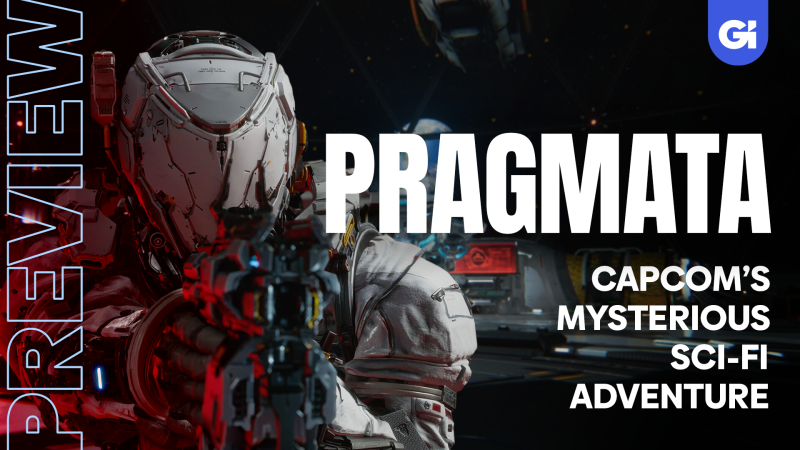
Pragmata is Capcom's new sci-fi third-person action-adventure, with a combination of gunplay and hacking that makes you feel like you're texting and dodging at the same time. We got hands-on time with it back in June, at Summer Game Fest 2025, and now we've got some footage of it to share amid Gamescom 2025.
So, this is our preview from June combined with the most recent footage, covering the same sections of Pragmata and showing off what Capcom's new experiment looks like in real time. Enjoy!
